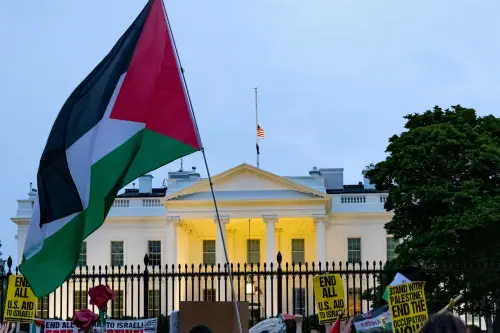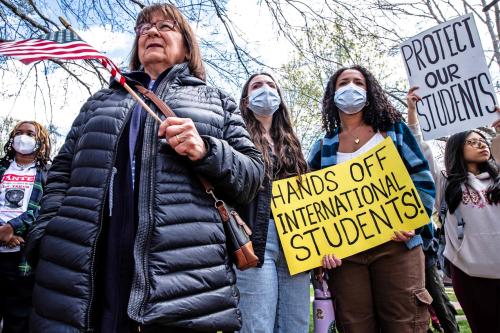

2:00 am +04 - 3:30 am +04
Past Event
Content from the Brookings Doha Center is now archived. In September 2021, after 14 years of impactful partnership, Brookings and the Brookings Doha Center announced that they were ending their affiliation. The Brookings Doha Center is now the Middle East Council on Global Affairs, a separate public policy institution based in Qatar.
On October 29, 2013, the Brookings Doha Center (BDC) hosted a public eventwith General Sir David Richards, former Chief of Defense Staff of the British Armed Forces and former principal military advisor to the British Prime Minster from 2010–2013. Sir David focused on the impact of military intervention on nation building and education, and the role that effective military strategy plays in affecting these outcomes. The event was moderated by BDC Director Salman Shaikh and attended by members of Qatar’s diplomatic, business and media communities.
In his opening remarks, Sir David outlined the importance of a clear, overarching strategy in determining whether a country should intervene militarily. No country should intervene, he stated, unless it has thought the conflict through “to an acceptable end state.” As armed forces can only buy time and space for a political solution to take effect, an “intervening plan” must be prepared to win the peace through social, economic and political initiatives once the fighting has concluded.
Unfortunately, he stated, most recent interventions have been characterized by a short-term, tactical focus poorly rooted in a strategic logic. This he argued leads to poor coordination and communication between different sectors involved in executing the intervening strategy, as each becomes walled off in its own sphere of activity, or “silo”. Quoting Sun Tzu, he reminded the audience that “strategy without tactics is the slowest route to success; tactics without strategy is merely the noise before defeat.”
Sir David emphasized that many political leaders, though prepared to go to war, do not fully take into account the severe humanitarian impact of such interventions on local society and institutions, including education systems. Nor are they sufficiently aware of the difficulties in coordinating the various elements of an effective military strategy. As a result, he cautioned that “most intervention operations, at least for some time, aggravate the plight of the people,” raising questions about their legality even under the Responsibility to Protect doctrine.
Asked about the military’s role in nation-building, Sir David noted that such efforts “should not be written off,” but counseled that lessons learned in the past must be applied properly towards future conflicts. Looking back to the end of World War II, he cited the strategic vision of rebuilding Germany after 1945, which included quickly reinstating functional local and regional governments, and the massive investments the Marshall plan provided in Western Europe.
He contrasted this with the Iraq invasion of 2003, describing it as “a masterful tactical operation mired in strategic disaster.” Sir David referred to it as the “poster child of a war not thought through,” and acknowledged arguments that the invasion weakened a secular pole of power against Iran’s influence. He also faulted a lack of long-term planning in the 2011 Libyan intervention, where despite extensive planning sessions among British officials and other coalition members the intervening force failed to provide the funding and institutional support for “the day after” in post-Qaddafi Libya.
Sir David noted that military interventions had been successful in the past, in cases such as Kosovo in 1998 and East Timor and Sierra Leone in 2000, but pointed out that these were properly-resourced, well-though-out ventures. He also stated that operations in Afghanistan in 2001-2002 were sufficiently “well-thought-out,” but suggested that a “heavier touch” in the country, particularly in terms of civil operations, might have led to better outcomes. In his view, investment in non-military activities did not reach appropriate levels until the 2009 surge of American troops under President Obama.
When asked further about outcomes in Afghanistan, while Sir David conceded that initial “high hopes” for Afghanistan’s future had not been realized, he pointed to a broad consensus of actors in Afghanistan and in neighboring countries satisfied with progress achieved since 2001. He referred to polls indicating that a vast majority of Afghans wanted to stick with the gains made thus far, with some 7 million children attending school and the national economy beginning to improve. He deemed the success of upcoming elections as vital to the country’s future, with credible candidates such as Abdallah Abdallah and Ashraf Ghani on the ballot.
Turning to education, Sir David credited the Gulf states for recognizing the importance of education in shaping Afghanistan’s future much earlier than did Western countries. All involved parties now recognize the importance of long-term strategies, such as education, in building a safe and stable Afghanistan. Still, he cautioned that a surge in education investment unmatched by economic growth and job opportunities “risks trouble,” as those graduating from the schooling system find no outlet for their aspirations.
Commentinge on Pakistan’s extensive role in Afghanistan, Sir David argued that Pakistan’s support for the Taliban during the 1990s was, in their eyes, “entirely logical.” Still, while recognizing Pakistani desires for a stable Afghanistan under the Taliban at the time, particularly in light of the 6 million Afghan refugees who fled to Pakistan during 1993-1995, he emphasized that attitudes began to shift in the wake of 9/11. Pakistani leaders such as General Pervez Musharraf increasingly realized their country’s interest in a safe, secure Afghanistan not dominated by the Taliban, particularly in light of growing Taliban strength within Pakistan’s own tribal areas.
Going forward, Sir David underscored the need for the Taliban’s inclusion in the political process, despite the animosity many Afghans feel towards the group. While allowing that some hardliners among the group do not want to participate in discussions, he noted that a broad range of actors accept this necessity. Likewise, with respect to al-Qaeda elements present in Syria, he emphasized the need to distinguish between “hard-core” elements and “temporary bedfellows” in attempts to engage with or counter such groups.
Asked about the potential for military operations in Syria, Sir David replied “If you’re going to go to war, do it properly.” He criticized the language of some politicians regarding “shots across the bow,” arguing that such a “warning” attack could simply aggravate the humanitarian crisis in Syria without securing strategic goals. Similarly, while emphasizing the need to contain the Syrian conflict, he cautioned that even maintaining a humanitarian corridor within Syria through force would amount to an act of war. Though not opposed to military action, he warned that improving the situation would require resources “beyond the appetite … of all the countries that are prosecuting this war.”
When the floor was opened up to questions, audience members asked Sir David about the difficulties of reconciling Afghanistan’s internal conflicts between competing warlords and armed groups. Sir David emphasized the need to provide a “second chance” to all parties interested in a stable solution, pointing to next upcoming elections as such an opportunity. Despite underlying ethnic tensions, he noted the current strength of a broad “Afghan” identity among the country’s population, as evidenced by pan-ethnic political alliances on display in the run-up to next year’s elections.
When asked about how fallout from the Iraq war had affected efforts to intervene in Syria, Sir David noted that a certain “war-weariness” had taken hold in the United States in the wake of strategic failure in Iraq, hampering efforts to intervene elsewhere. While he stressed that the scale of the humanitarian crisis in Syria combined with the danger of growing extremist groups would eventually provoke a response to Syria, he repeated that such a response was “on a scale” that deterred all countries from intervening at the present time.

Yingyi Ma, Ying Lin
July 14, 2025

Shibley Telhami
May 1, 2025

Yingyi Ma
May 1, 2025